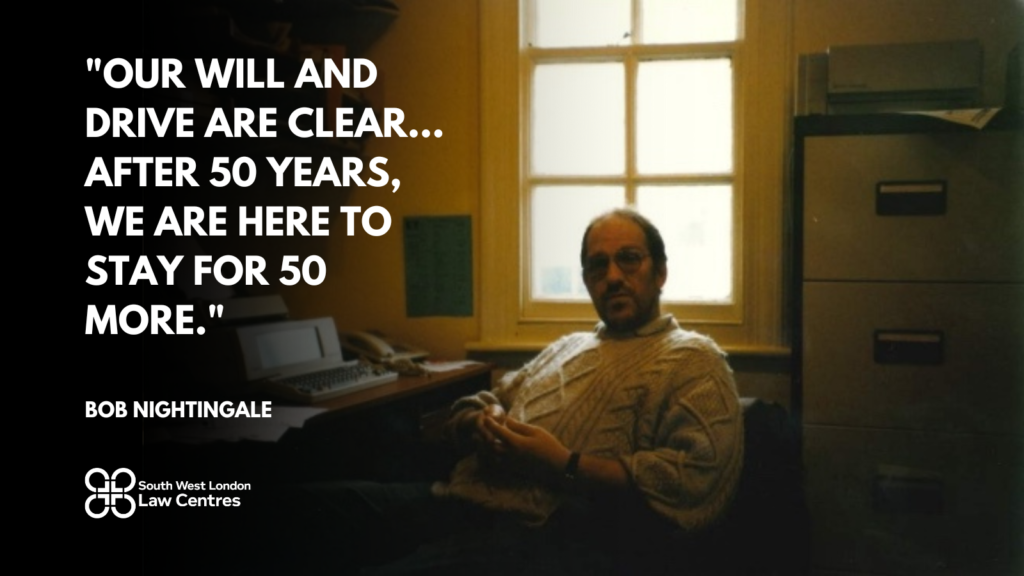Bob Nightingale: Lessons from our past, 50 years of more than just advice

As we celebrate the 50th anniversary of South West London Law Centres, it’s important to reflect on how far we’ve come. Before we take you on that journey with us through our friend, Bob Nightingale’s words… it must be noted, even as we mark this 50 years of pride in our work, the fight is far from over.
The relentless attacks on the immigration and advice sectors, combined with hostile legislation and far-right rhetoric, threaten our very existence. These forces aim to undermine the vital work we do and erode protections for the most vulnerable. The post-LASPO landscape and the lasting effects of COVID-19 have also made it harder than ever to provide the critical services our community depends on.
Now, more than ever, we need you to stand with us. The threats we face require immediate action to build the foundations for our survival and the mechanisms to protect our mission. Your support is crucial. Please consider making a donation today to help us continue our essential work and safeguard our future.
Our journey as told by Bob Nightingale…
“We began with three centres in Balham, Battersea, and Wandsworth (Garratt Lane)… However, by the time I joined in 1982 to start my 25-year tenure, the organisation had already faced significant funding cuts. These cuts had reduced us to a single entity, the “Wandsworth Legal Resource Project (WLRP).” Remarkably, the service was only preserved because the dedicated staff from the closed centres contributed their redundancy money to keep it running.
I was immediately struck by the desperate needs of the clients and the commitment and skill of the wonderful staff. Throughout my time there, those two elements remained unchanged.
Over the following few years, GLC funding allowed the Law Centre to expand, leading to the establishment of two more centres in Tooting and Putney. This growth enabled us to help far more people. The staff undertook significant casework while we developed pro bono services, supported by volunteer lawyers from both local and City firms, to increase our advice capacity. For a short while, we had risen from the brink of collapse and the service flourished. However, when the GLC was taken over by the Conservatives, responsibility for funding the Law Centres was transferred to Wandsworth Council.
The Council was not fond of the Law Centres. They disliked being held to account and regularly challenged in the County Court, and occasionally in the High Court. In 1990, they cut all funding to the Centres.
As a result, Tooting and Putney were forced to close. The WLRP was reduced to two part-time staff, funded by a donation from Fiona McTaggart. For a moment, it seemed like our mission was at an end. Until an article and an appeal in the Guardian led to an anonymous donation of £20,000 per year, which allowed us to begin to recover.
Driven by the urgent need for free legal advice and the clear understanding that we required far more resources to help as many people as possible, we began applying for grants from major trusts. The big London trusts responded brilliantly. The City firms that were providing pro bono services also contributed funds, and we claimed legal aid wherever possible. As a result, we grew.
We reopened the Tooting office and, responding to calls for help from Merton, opened an office there as well. “London Councils” began funding us, enabling further expansion. We opened an office in Kingston and partnered with Citizens Advice in Sutton, Croydon, and Richmond to provide services to those boroughs as well.
At that point, we were operating as three separate services, but London Councils decided they would prefer to support multi-borough organisations. As a result, we merged into a single entity: South West London Law Centres.
To skip to the end of my tenure, through a combination of office-based casework, pro bono services, and partnership working, we ended up helping 26,000 people in the year I left.
The Government was never supportive. Starting in the 90s, they steadily undermined legal aid. First, they changed the payment system from payment per hour to payment per case, which made it particularly difficult to assist the most disadvantaged people, whose cases often took longer. Then, they introduced contracts that were incredibly heavy on bureaucracy.
We only survived because 50% of our income came from other sources. Many Law Centres and High Street Legal Aid firms weren’t as fortunate and didn’t survive at all.
Against the odds, we maintained an exceptional success rate, a testament to the expertise and dedication of our solicitors and caseworkers. I was especially proud when the late Finola O’Neill received a LALY award for winning 212 benefits appeals in a row—a remarkable achievement in the face of increasing challenges. It also fills me with pride that four young lawyers we recruited as trainees have not only stayed with the Law Centre but have grown into senior solicitors who continue to fight the good fight. Katy Forkah, Pradeep Kumar, and Jeinsen Lam are now team leaders, and Rajitha Kumar has also received a LALY award for her outstanding work with immigration clients, proving that our commitment to excellence endures despite every challenge we’ve faced.
I am incredibly proud to have been part of this journey, especially knowing that, despite our heavy caseloads, we remained steadfast in our commitment to social policy work. Our will and drive are clear… after 50 years, we are here to stay for 50 more.”
Bob Nightingale
Friend of South West London Law Centres
